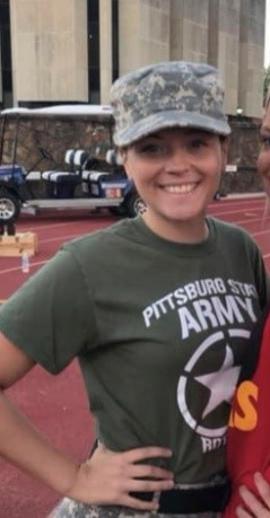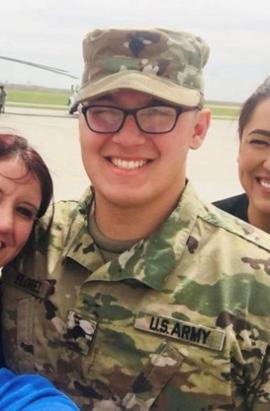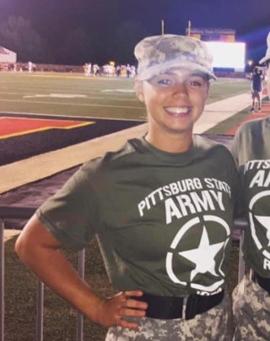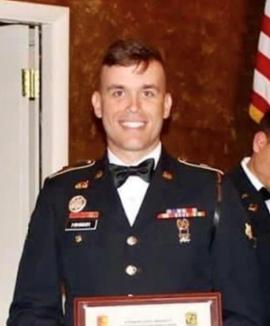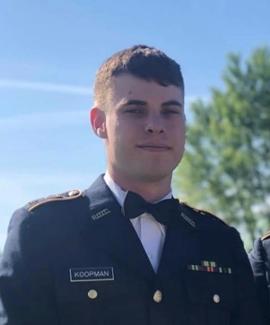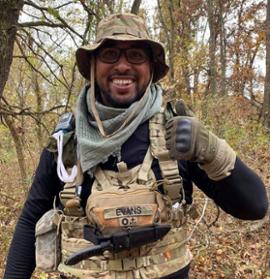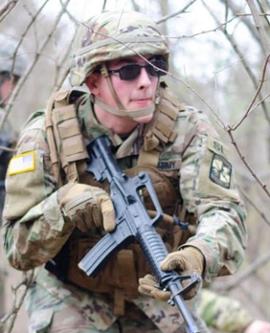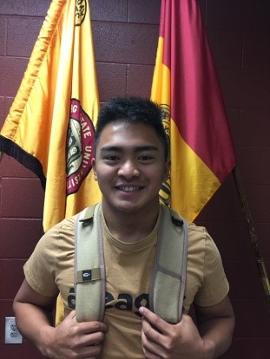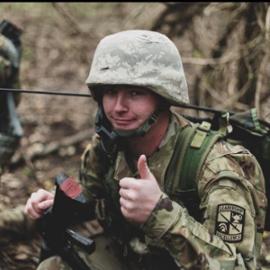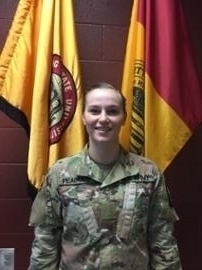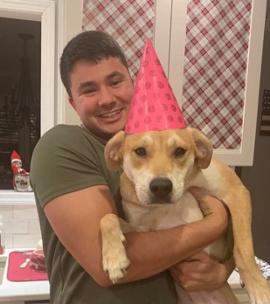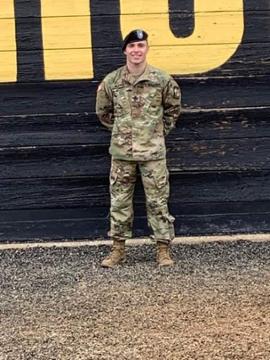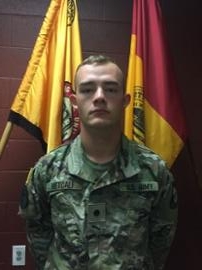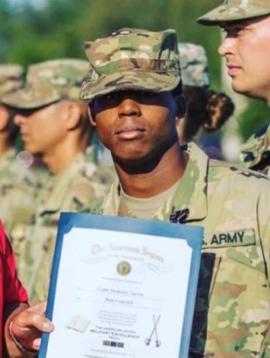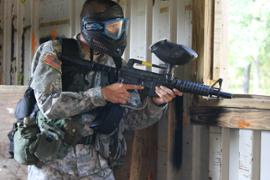Experience the Camaraderie of ROTC
When you become a part of Army ROTC, you're not just working toward a diploma, but an even brighter future as a leader alongside other motivated cadets. But make no mistake—you're a student first. You'll have a college schedule like your fellow students, but you'll also receive classroom and field courses that will challenge and excite you. Beyond that, you can take part in events and activities with fellow cadets that will make your college experience even better.
- Cadet Battalion Leadership
- Company Leadership
- Cadet Profiles
- Training Events
- Summer Training and Travel Opportunities
- Photo and Video Galleries
Gorilla Cadet Battalion Leadership
|
The Battalion Commander (BN CDR) is directly responsible for the operations of the Gorilla Battalion. The BN CDR approves and oversees all battalion operations and reports directly to the Professor of Military Science. Along with the Battalion Executive Officer (BN XO) and the Command Sergeant Major (BN CSM), the BN CDR guides the Battalion towards success. The BN CDR leads from the front by being the highest ranking Cadet officer and setting the example for the rest of the Cadet battalion. |
|
The BN CSM is the senior enlisted adviser to the BN CDR on the state of morale, discipline, and training of Cadets within the gorilla battalion. The main responsibility of the CSM is to set the standard for all training events and to be an example to follow. The CSM leads from the front by supervising battalion physical fitness, labs, the mentorship program, and other Cadet training programs. |
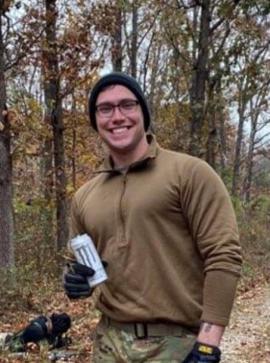
Battalion Executive Officer, C/MAJ Phillip Conners The BN XO is second in command of the gorilla battalion and oversees the operations and plans of all specialty shops. He also prepares subordinate units for future taskings by organizing and scheduling weekly battalion leadership meetings. The BN XO also is tasked to monitor battalion readiness in all planned events and to ensure all key leaders are doing their duties to standard. |
|
Battalion S1, Human Resources Officer, C/CPT Nicole Shifflett The BN S1 is the primary staff officer responsible for all matters concerning human resource management at the battalion level. The S1 is responsible for recording attendance for battalion events, to keep track of all personal qualifications and accomplishments of individual Cadets, and to advise and offer solutions to the BN CDR on personnel issues and readiness. |
|
Battalion S2, Intelligence and Security Officer, C/CPT Ryan Hinman The BN S2 is the principle staff officer responsible for all matter pertaining to unit security and enforces the provisions of security requirements for the battalion. The S2 provides terrain analysis, weather data, and threat information for battalion planning, and serves on event staffs for conducting and planning battalion training events. |
|
Battalion S3, Operations and Training Officer, C/MAJ Jared Koopman The BN S3 is the principal staff officer responsible for the planning and coordination of all battalion events, both present and future. He is responsible for managing and leading future and current operations. The S3 utilizes the (administration and logistics operation center) ALOC to delegate battalion responsibilities and to ensure deadlines are met in accordance to the battalion long range training calendar. |
|
Major: Psychology | Hometown: Carl Junction, MO |
|
Major: History | Hometown: Fayetteville, NC
|
|
Battalion S4, Logistics Officer, C/CPT Vince Tome The BN S4 is the principle staff officer that is responsible for battalion logistics. The main responsibility of the S4 is to ensure all Cadets are supplied with the proper equipment and to ensure that resources such as food, water, and ammunition are readily available for training. The S4's tasks consist of overseeing the maintenance and issue of sensitive items such as weapon systems and training aids, writing memorandums for future battalion expenses, and monitoring the Cadet fund budget throughout the year. |
|
Battalion S5, Information Operations Officer The BN S5 is the principal staff officer for all matters concerning the Positive Information Campaign. The S5 helps establish a positive and continuous relationship with alumni and outside organizations to help build a strong and lasting support system for the battalion. The S5's main responsibility is to ensure that all battalion events and accomplishments are documented and presented in a professional manner.
|
|
Battalion S6, Signal and Communications Officer, C/CPT Parker Mason The BN S6 is the principal officer for all matters of command, control, communications, and computer operations. The main responsibility of the S6 is to develop and perform modifications to the PSU Army ROTC webpage and to oversee the maintenance and issue of radios during training events. The S6 is also responsible for maintaining the operation of the Cadet Training Office as well as assisting the S5 in updating the battalion's social media websites.
|
|
Battalion Public Affairs Officer (PAO), C/1LT Jordan Hamrick
|
|
Battalion Medical Officer (MEDO), C/ 1LT Ryan Hemby The BN Medical Officer is primarily responsible for providing emergency medical treatment, limited primary care, health protection and evacuation from a point of injury or illness, and servicing and maintaining all medical equipment. They are also responsible for ensuring all possible COVID mitigation standards are met within the Battalion during training exercises. Provides necessary wellness guidance to leadership. |
Alpha Company
|
|
|
Alpha Company XO, C/1LT Charles Holmgren The Company XO is the second in command of the company and assumes command and commander responsibilities in the Company Commander’s absence. They supervise and coordinate the efforts of the company staff in the planning and execution of company level events. Responsible for the safety and risk assessment of all company events and training, and insures company staff suspenses are met and remains knowledgeable of the current status of staff actions.
|
|
Alpha Company First Sergeant, C/1SG Aaron Mackey |
Alpha Company Platoon Leaders
Platoon leaders plan, resource, execute and assess training at the platoon level. They write operation orders, request training resources, conduct mission briefs and assess training. A platoon leader’s primary job is to inspire and influence his/her platoon to accomplish the mission. They do this by providing purpose, direction, and motivation to accomplish the mission and improve the organization.
|
C/1LT Brockton Budke
|
|
C/1LT Tyler Metcalf
|
|
C/1LT D’Andre Phillips Coble 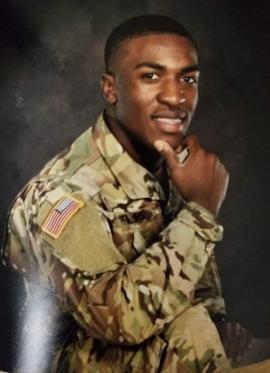 |
|
C/1LT Damon Gettis |
ROTC Offers Many Opportunities to Excel
In Army ROTC, it's not all classroom time and field training. There are many opportunities to get to know your fellow cadets and increase your skills in a variety of areas. Learn more about these events and activities below.
The purpose of these events is to develop the core leadership competencies that make an Army officer. Leadership competencies improve over an extended period of time, but the more you participate in the program, you will gain valuable leadership experience and acquire the confidence to be a proficient leader. Please reference Core Leadership Competencies if you would like more information.
The following attributes that are expected from Army Officers:
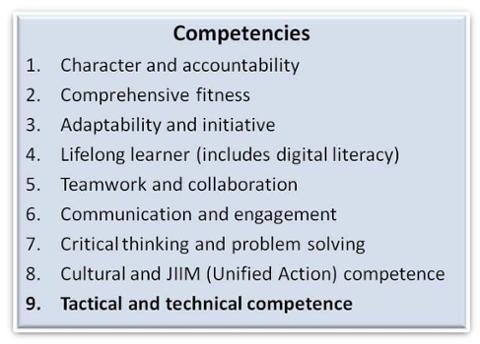
Field Leadership Reaction Course (FLRC)
Throughout each semester, cadets have the opportunity to participate in a field leadership reaction course (FLRC). The purpose of FLRC is to test your confidence and your ability to communicate a plan with a team. During the event, you are assigned to a squad (a team of 9-13 cadets) and then provided with a detailed mission to complete. By using your leadership and teamwork skills, you and your squad will motivate and push each other to complete the mission and overcome any obstacles.
FLRC is conducted at the Greenbush Education Center located just west of Girard, KS.
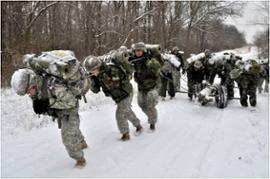
LTX (Leaders Training Exercise)
A Leaders Training Exercise is conducted twice a year at Camp Clark near Nevada, and Camp Crowder, with the purpose of evaluating a cadet’s leadership and teamwork skills. The MS IV Class is responsible for the planning and development of training with supervision from our cadre. Training is focused around the MS III class in order to prepare them for CLC. Cadets are evaluated on Garrison Operations, Squad STX Lanes, Patrolling, and Land Navigation. MS I and II cadets operate as squad members and gain valuable experience but are not evaluated. View more LTX photos below in the Photo and Video Galleries.
Ranger Challenge
Ever wanted to fire an M16A2 rifle? Repel down a 60 feet tower with a 35 pound ruck sack? Participate in tactical scenarios that push you to your physical and mental limits? If you ask questions like these or have a drive to try new exciting things, Ranger Challenge is the answer for you.
Ranger Challenge can be considered the "Varsity" sport of Army ROTC. Every year Gorilla Battalion cadets travel to a host university or military base to compete with multiple colleges and universities in a series of military tasks. In order to prepare for the competition, teams are tested mentally and physically by completing rigorous training and classroom instruction. Just like a high school sport, Ranger Challenge requires a great commitment to the team, accountability, and a determined mindset. View more Ranger Challenge photos below in the Photo and Video Galleries.
Ranger Challenge Competition Events:
- Rope Bridge Assembly.
- Hand Grenade Assault Course.
- Army Physical Fitness Test (APFT).
- M16A2/M60 Disassembly and Assembly.
- Land Navigation.
- 10 K Road March.
Ranger Challenge Fall 2014
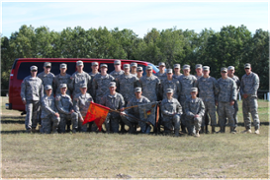
Bravo Team - 2014 Regional Champions
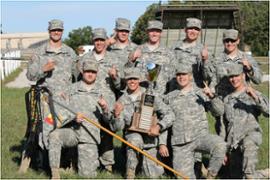
As of Fall 2014, The Gorilla Battalion earned the title of Regional Champions. After competing against 22 universities and colleges, Bravo team took the 1st place position. Bravo team then went on to take 4th out of 44 schools during the Brigade Level Competition.
Color Guard
A time honored tradition at PSU, gorilla battalion cadets present the colors (United States and Kansas State Flag) at ceremonial events, including home football games and local parades. Color Guard training demands precision and coordination from participating cadets which enhance their drill and ceremony skills. The Gorilla Battalion Color Guard is in high demand by groups and communities in and around the Pittsburg area due to the exceptional performance by its members.
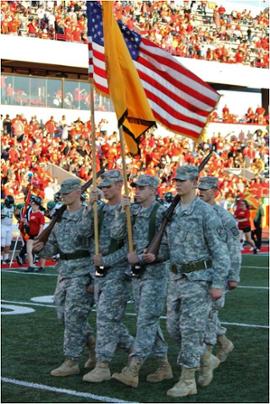
Cannon Crew
This elite group displays the Army’s strength through firepower and, sometimes push-ups, at PSU home football games. After each Pitt State touchdown, the 75mm cannon is fired and push-ups are conducted according to how many points have been scored. Wimps need not apply because this group’s motto is: "Only the Strong Survive".
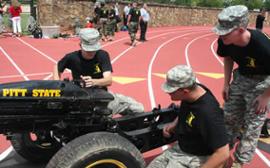
Commissioning Ceremony
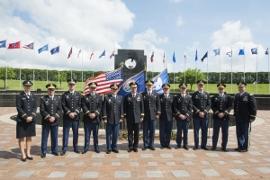
Each spring, several cadets are commissioned into the United States Army during ceremonies held on each campus. Families, friends, the University President, and other distinguished guests take part in the commissioning, as well as the ceremonial "First Salute" tradition. To view more Commissioning photos, visit the Photo and Videos Galleries below.
AIRBORNE TRAINING
The U.S. Army Airborne School, located at Ft. Benning, Georgia, is available to cadets that are enrolled in the program. The course is three weeks, consisting of a ground week, tower week, and jump week. With each week comes different types of training designed to teach you how to parachute out of airplanes and helicopters. It is an exciting non-stop course that will push you to the limit. AIRBORNE!!!
AIR ASSAULT TRAINING
"Stand up, hook up, slide down the rope!" This school combines the utility of rappelling with the excitement of riding in helicopters. Also, students learn how to hook objects like howitzers and Humvees underneath hovering helicopters. Air Assault is as mentally challenging as it is physically demanding. It requires the student to be strong in both mind and body before attending. The reward for 10 days of hard work is the coveted air assault badge.
CULTURAL UNDERSTANDING AND LANGUAGE PROFICIENCY (CULP) PROGRAM
Every year hundreds of cadets travel the globe, spending up to three weeks immersed in foreign cultures. The Army recognizes the need for young leaders to develop more cultural awareness and foreign language proficiency skills. Cadets now receive opportunity to compete for immersion in more than 40 countries. These opportunities expose them to everyday life in different cultures and intensifies language study, which helps produce commissioned officers who possess the right blend of language and cultural skills required to support global operations in the 21st Century.
PROJECT GO
Project Global Officer (Project GO) is a collaborative initiative that promotes critical language education, study abroad, and intercultural dialogue opportunities for Reserve Officer Training Corps (ROTC) students. Project GO programs focus on the languages and countries of the Middle East, Asia, Central Asia, Africa, and South America.
CADET TROOP LEADER TRAINING (CTLT)
CTLT increases each cadet's leadership experience. Each Cadet is assigned to a platoon leader position and given an opportunity to lead soldiers. It familiarizes cadets with the command, training, administration, and logistical functions of active duty units. It also exposes cadets to the on-duty and off-duty environment of the junior officer.
NURSE SUMMER TRAINING PROGRAM (NSTP)
Nursing students who are also Army ROTC cadets have an opportunity for a unique summer nursing experience. The paid, three-week Nurse Summer Training Program assigns cadets to Army hospitals throughout the U.S. and Germany. The nursing program introduces you to the Army Medical Department (AMEDD) and to the roles and responsibilities of an Army Nurse Corps Officer. Under the supervision of an experienced Army Nurse Corps Officer, you will obtain hands-on experience. Your one-on-one clinical experience will allow you to hone your clinical skills, develop your problem-solving techniques, and become comfortable with developing your professional skills as a member of the U.S. Army Healthcare Team.
Locations:
- Brook Army Medical Center (BAMC), San Antonio, TX
- Tripler Army Medical Center (TAMC), Honolulu, HI
- Darnall Army Community Hospital, Fort Hood, TX
- Walter Reed Army Medical Center (WRAMC), Washington, DC
- Dwight D. Eisenhower Army Medical Center, Fort Gordon, GA
- William Beaumont Army Medical Center (BAMC), El Paso, TX
- Landstuhl Regional Medical Center Landstuhl (LRMC), Germany
- Womack Army Medical Center (WAMC), Fort Bragg, NC
- Madigan Army Medical Center (MAMC), Fort Lewis, WA
ENGINEER INTERNSHIP PROGRAM (EIP)
This internship is sponsored by the U.S. Army Corp of Engineers (USACE). This program is sponsored and funded by the U.S. Army Corps of Engineers (USACE). Cadets will typically work in USACE District (Battalion or Brigade Command equivalent), usually in a resident office (construction office) working on civil, mechanical, electrical, or environmental engineering projects. Districts are located all across the U.S. (36 Districts), and OCONUS (5 Districts). Projects support U.S. Army or Air Force installations (military construction) or state and local communities (civil works-dams, levees, navigation, etc.). Cadets may perform engineering functions such as design, project management, project engineer, construction representative (Quality Assurance), GIS, and more. Program focus is engineering majors. Majority of slots focus on civil, mechanical, and environmental engineering; however, all engineers should apply. Applicants are slotted based on host requirements. Slots are requested based on the applicant's majors. Usually there are many more available slots than cadets; so many possibilities are available to choose from.
Locations: Cadets in the EIP may serve at locations within the continental United States (CONUS) or outside the continental United States (OCONUS).
Prerequisites:
- Enrollment in a science, computer, or engineering program.
- Possess an approved Top Secret or interim top security clearance at the time of application submission. No exceptions.
- Meet current APFT and height/weight standards at the time of application and during attendance.
- MS III Cadets have priority. However, MS IV Cadets graduating December or later may apply as an exception to policy.
- GPA of 2.5 or better in academic major
